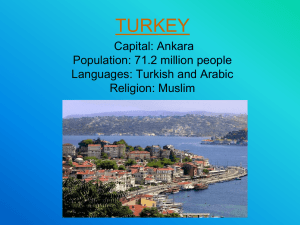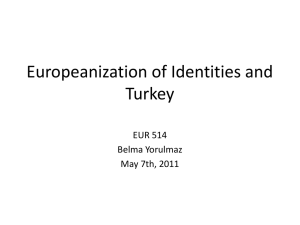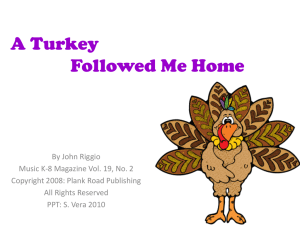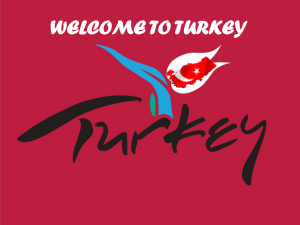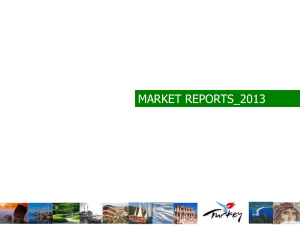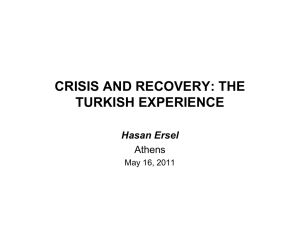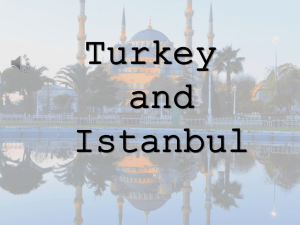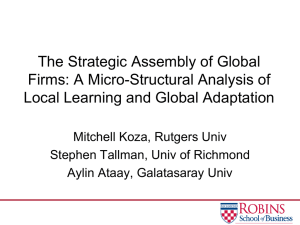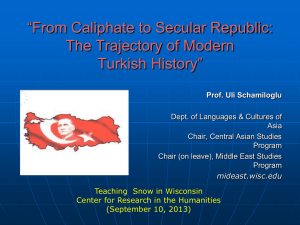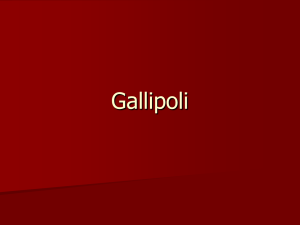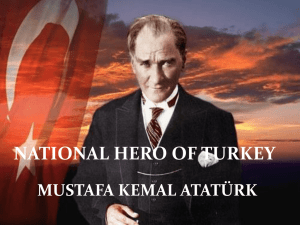The Impact of Turkey`s EU Accession Process to Turkey
advertisement
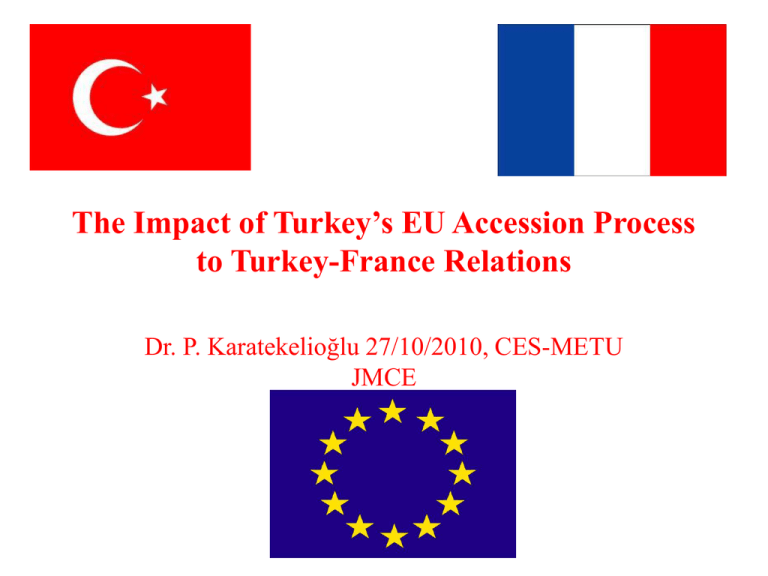
The Impact of Turkey’s EU Accession Process to Turkey-France Relations Dr. P. Karatekelioğlu 27/10/2010, CES-METU JMCE Research Question • To what extent Turkey’s EU membership process impacts bilateral relations between Turkey and France? Challenges and Prospects Time period of the research presented (1996-2009) France’s questions / Turkey’s responses Paper in progress overview Historical Legacy: diplomatic cultural economic relations Economic and Trade Relations Political Discourse Public Opinion Political and cultural dialogue Historical Legacy • History of diplomatic relations (15th century; establishment of the modern Turkish republic) • Comparative studies on state tradition • Cultural relations (education, language, literature; high schools, universities, cultural centers) Historical Legacy • Strategic partnership (NATO as the defense umbrella of Western democracies during the cold war, military and strategic alliances) • Economic and Trade relations (growing intensity of import-export and investment; partnerships) • French perspective with regard the EU and Turkey’s role in the Union; current domestic political and economic issues in France Political Discourse • Existence of ambivalent rhetoric in the EU regarding Turkey’s membership is a major factor that affects: full compliance with the EU’s political conditionality weakens EU’s credibility factor (post-1999; 2004; 2006) negative impact on bilateral relations (i.e. France) Political Discourse • French debates questioning the Europeanness of Turkey and its EU membership (years 2002-2007 peak of debates): Different political actors, different perspectives (identity; political criteria or culture) Most influential is governmental level discourse reflections in the media Political Discourse Jacques Chirac (Presidency: 1995-2007; 2002 UMP) support to Turkey’s candidacy for EU membership in December 1999 Helsinki Summit: “the EU with unanimity voting has recognized Turkey as a candidate country for EU membership … France as a result of long lasting multi-dimensional relations between the two countries (from the period of François 1er and Kanuni Sultan Süleyman) has given all possible support to this new area of partnership that will lead Turkey to full membership …” (13.12.1999, letter to then President Süleyman Demirel). Political Discourse Valéry Giscard d’Estaing (Presidency: 1974-1981; President of European Convention 2002-2003; 2004 UMP) Cultural, demographic and political arguments “Turkey cannot belong to Europe … It is not a European country … those who have promoted most the enlargement towards Turkey are the adversaries of the EU ” (November 2002). Political Discourse Partie Socialiste (PS): Supports Turkey’s EU accession process in the condition that the political conditionality for EU membership is fulfilled speeches of Ségolene Royal presidential elections campaign during 2006-2007 Political Discourse Nicolas Sarkozy (Presidency: 16 May 2007- ; 2002 UMP): Europe needs borders and limits to work efficiently argument “It is in the view of the Mediterranean Union that we must consider the relationship between Europe and Turkey… Turkey has no place in the EU because it is not a European country” (February 2007, Toulon speech). Political Discourse Nicolas Sarkozy’ s government / French Presidency of the European Council: July 1, 2008- January 1, 2009: • Discourse shift economic/trade partnership, EU harmonization reforms, common foreign and security policy objectives (peaceful relations with neighboring countries; cooperation under the framework of UfM); • Chapter 10 Society of Information and Media; Chapter 4 Free Flow of Capital opened in December 2008. Political Discourse Discourse of French political elite: It does not necessarily reflect the French government’s main position (i.e. François Fillon, Pierre Lellouche, Bernard Kouchner…) or opposition parties, need further analysis and research; yet, it is very influential on public debates, media coverage (newspapers are main sources of info about the EU enlargement according to 2002 Special EB survey). Public Opinion • According to IFOP, 2004- 2008 France 67% in 2004 ; 80% in 2008 • According to Special EUROBAROMETER (EB), July 2006 Attitudes towards Turkey’s accession EU 48% (Standard EB 64 55% is opposed) France 54% opposed higher than EU average primarily in the interest of Turkey argument Public Opinion Views on Future enlargement, priorities at the EU level (Flash EB 257, 02/2009): Freedom and democratic values (significant) Economic issues Immigration issues Cultural and religious issues Stability at EU’s borders EU’s role in the world (significant) Ageing of European population Economic and Trade Relations • Turkey and France investment partners; are important trade and • In France, Business and Trade Unions attitudes are relatively positive when compared to other domestic political actors, • The role of the private sector is very important in promoting better relations between France and Turkey. Economic and Trade Relations • 1987 established Turkish-France Business Council under DEİK (events, activities to promote the development of economic relations) TÜSİAD-TOBB-MEDEF “French-Turkish Partnership, Being Stronger in Europe and the World,” October 8, 2009. Economic and Trade Relations From January 1996 onwards and specifically between 2000-2009 bilateral trade has increased 156 % and reached 13.3 billion $ French import of Turkish products: 6,2 billion € (tenth after China, Switzerland, UK, Germany) French exports to Turkey: 7,0 billion € (twelfth after Japan, Russia, Spain, Germany) Economic and Trade Relations • Export products: road transport vehicles, electrical devices, coal and steel, energy producing devices, pharmaceutical… • Import products: road transport vehicles, textile, vegetables, fruits, communication devices, energy producing devices… Economic and Trade Relations Large scale French firms invest in strategic sectors in Turkey (i.e. Automotive, finance and banking, food, insurance, cement) Renault, Peugeot, Lafarge, Carrefour, Danone, Axa, BNP, Groupama etc. (more than 50.000 people are employed in these firms) Turkish firms in France increased from 22 to 49 (20002009) Economic and Trade Relations • Promotion of investment and trade • Cooperation in third countries • Visa, transport quotas and free trade agreements affects Turkey’s competitiveness under the Customs Union Agreement Promoting Political and Cultural Dialogue There are several other variables that influence French opinion with regard Turkey’s EU accession: general attitude towards enlargement, economic crisis (rising unemployment rates) cultural issues Promoting Political and Cultural Dialogue • EU Strategy for Turkey’s Accession Process, January 2010: I. Official negotiation process, II. Commitments to the National Programme for the Adoption of the Acquis (2008), III. Political Criteria, IV. Communication Strategy. Political Dialogue • Foreign Policy Objectives: Neighborhood policy; peace-keeping operations under NATO; fight against terrorism International economic crisis (economic activities linking trade and development; common position for a renewed financial system and fight against economic crisis; G-20 summit) Political Dialogue • Foreign Policy Objectives: Bernard Kouchner (Minister of Foreign and European Affairs, PS, Independent 2007- ) visit to Minister of Foreign Affairs Ahmet Davutoğlu, October 11-12, 2010: Expressed political will to deepen cooperation on security policy and foreign policy (Middle East Policy -peace process); economic policy (G20 presidency of France); cultural relations (opening of Lycée Charles de Gaulle). Cultural Dialogue • Turkey’s EU Communication Strategy, January 2010: (1) towards the EU (2) towards Turkey Public institutions, private sector, civil society, media cooperation; to explain the contributions of Turkey’s EU membership, i.e. security, culture, democracy, economy arguments, different content and methods of communication different target groups. Cultural Dialogue The Cultural Season of Turkey in France July 2009 - March 2010 More than 400 cultural, political, economic events over the whole French territory To promote a better understanding and dialogue To present contemporary Turkey Impact assessment? Need sustainable projects… Cultural Dialogue 400.000 Turkish citizens living in France (half of them have dual citizenship) Tourism (nearly 1 million French tourists visit Turkey every year; 4th EU country) Education (third destination for Turkish students) Cultural centers, high schools, Galatasaray University (İstanbul, İzmir and Ankara) THANK YOU
